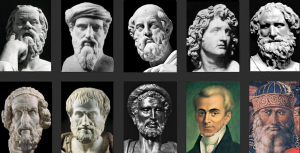
Statesman, Writer, Scholar (1270 – 1332)
Theodore Metochites was Prime Minister of the Byzantine Empire during the reign of Emperor Andronikos Palaiologos from 1282 to 1328. He was renowned for his knowledge, which he had acquired during his studies in Asia Minor as a youth and was considered in his own timeline as one of the greatest scholars and scientists of the Byzantine Empire.
Metochites’ involvement in politics began from an early age. Throughout his career he occupied many high-rank positions of power including General Logothete, involved with taxation and finance duties, Logothete of the Household, involved with fiscal and judicial duties and ultimately Grand Logothete, the highest rank of the hierarchy involved with the co-ordination and supervision of the government. As Grand Logothete he founded a library in Constantinople that was open to the public.
Like most Byzantine scholars, Metochites refrained from writing mostly original treatises. His most important work is Hypomnematismoi kai Semeioseis Gnomikai in which the writer makes personal comments and annotations on more than 80 different Ancient Greek and contemporary writers, on 120 treatises with philosophical and historical content namely Plato, Aristotle, Xenophon, Dion Chrysostomus and Plutarch. In the same book he explores themes such as Christian ethics and political issues. Other works include treatises on physics, physiology, poetry, rhetoric and psychology, commentaries on Plato’s Dialogues and on Aristotelian Logic.
Two are his most important treatises on astronomy: Preintroduction to Ptolemy’s Syntaxis and Elements of Astronomical Science. The books were important handbooks of astronomy containing theoretical and practical principles from Ptolemy’s books. The writer himself believed that astronomy was a science that linked man with God. With all the knowledge accumulated in his books, Metochites was able to predict solar and lunar eclipses. This knowledge was later disseminated to his students, who began a circle of astronomers, among them Nicephorus Gregoras, who presented original works in astronomy as well.
Evidently, Metochites was inspired by the Ancient Greek spirit. He devoted most of his life studying and reproducing the Ancient Greek writers. This proved to be of great importance during the laters years of the Renaissance. Because of his polymathy, is student Nicephorus Gregoras, another great philosopher of the Byzantine era, called him “living library” (ἔμψυχος βιβλιοθήκη).
Bibliography
- Βυζαντινών Ἱστορικά. Μεγάλοι Επιστήμονες του Βυζαντίου – Θεόδωρος Μετοχίτης. Vizantinonistorika.blogspot.gr. August 24, 2016. Web.
- Katsiaboura, Gianna. Θεόδωρος Μετοχίτης. Encyclopaedia of Hidrima Meizonos Hellenismou, Asia Minor. August 24, 2016. Web.
- “Metochites, Theodoros”. Helios New Encyclopaedic Dictionary. Passas, I. Athens: 1946. Print.

[…] in Constantinople under the supervision of John Glycys (“the Sweet”). He became a disciple of Theodore Metochites, the Grand Logothetes of the Byzantine Empire (roughly equivalent to today’s Prime Minister), who […]
LikeLike